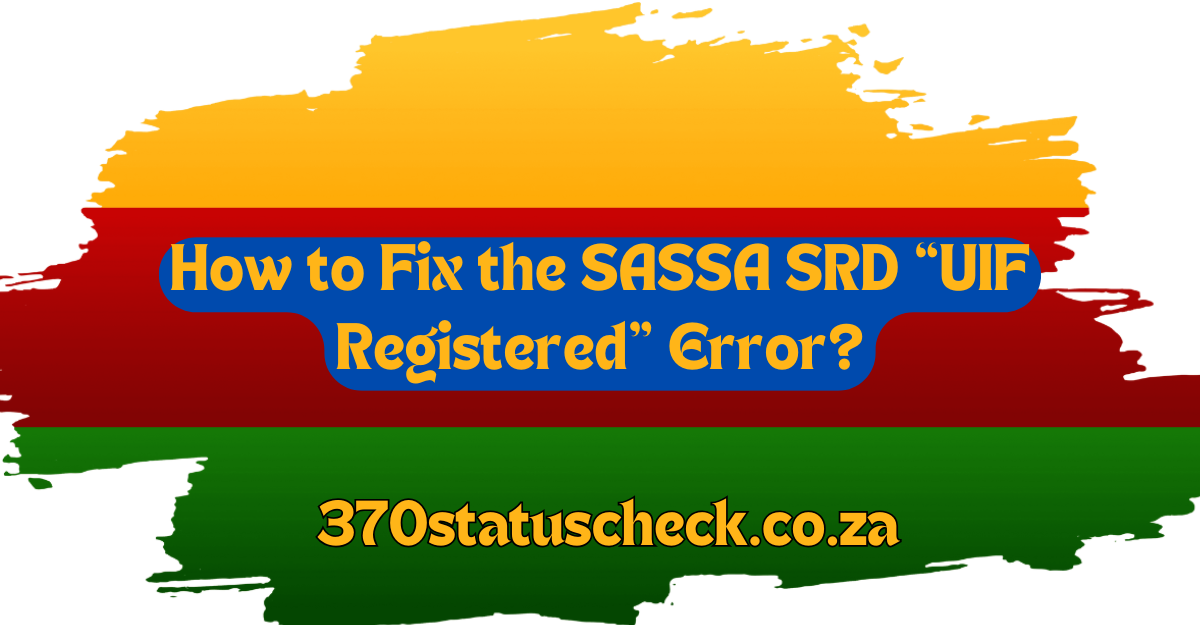When checking your SASSA SRD (Social Relief of Distress) grant status, getting a “UIF registered” error can be frustrating. This error usually indicates that you may be registered for Unemployment Insurance Fund (UIF) benefits, which can disqualify you from SRD assistance. However, many applicants encounter this issue mistakenly due to outdated or incorrect UIF information. This guide explains why the error occurs and provides a clear, step-by-step solution for resolving it and securing the financial aid you need.
How to Fix the “UIF Registered” Error on SRD Status? (Quick Steps)
- Check UIF Status: Verify your UIF status on the UIF portal or by calling the helpline. Ensure your record is marked inactive if you no longer receive benefits.
- Appeal on SASSA Portal: Visit SASSA Appeals, log in, and explain why “UIF registered” is incorrect.
- Gather Documents: Collect UIF Status Letter, recent bank statements, and a motivation letter.
- Submit Appeal: Upload documents to SASSA’s portal and monitor for updates.
What Does “UIF Registered” Mean for My SRD Grant?
In South Africa, the COVID-19 Social Relief of Distress (SRD) grant helps those in urgent need of financial support. The South African Social Security Agency (SASSA) manages this grant, collaborating with the Unemployment Insurance Fund (UIF) to check eligibility.
If SASSA finds your name in the UIF records, it assumes you are receiving UIF benefits, which makes you ineligible for SRD support. However, if you do not actively receive UIF payments, this “UIF registered” status can be a mistake, barring you from much-needed financial relief. Correcting this error is essential to accessing SRD funds.
Common Reasons for an Incorrect “UIF Registered” Error
The “UIF registered” error can appear on your SRD grant application due to several common factors:
- Old UIF Registration: You may have registered for UIF benefits previously but never actually received any payments.
- Exhausted Benefits: You received UIF payments in the past, but they have since stopped, yet your name remains in the UIF database.
- Database Errors: Sometimes, errors in the UIF system link your ID or personal details to an active status mistakenly.
SASSA uses this outdated information to make eligibility decisions, potentially disqualifying you. Fortunately, there are ways to dispute this error and clarify your eligibility status.
How to Fix the “UIF Registered” Error on SRD Status?
If you encounter the “UIF registered” error but do not actively receive UIF benefits, follow these steps to correct your application and get fair consideration for the SRD grant.
Step 1: Check Your UIF Status
Start by confirming your current UIF status:
- Visit the UIF online portal or contact their helpline to verify if you are actively receiving UIF benefits.
- If you have received UIF payments in the past, confirm whether your record has been marked as inactive.
If your record shows an inactive status, move to the next steps for your appeal.
Step 2: Appeal Through the SASSA Portal
To dispute the “UIF registered” error, you’ll need to submit an official appeal on the SASSA SRD portal:
- Go to the SASSA appeals website at https://srd.sassa.gov.za/appeals/appeal.
- Log in and select the option to lodge an appeal.
- Clearly state that the “UIF registered” error is incorrect and explain why you believe you are eligible for SRD support.
It’s crucial to do this within 30 days of the error notification to ensure your appeal is processed in a timely manner.
Step 3: Gather Supporting Documents
Strengthen your appeal by gathering documents that confirm your current financial need and verify that you are not receiving active UIF benefits:
- UIF Status Letter: Request an official letter from UIF that shows you do not receive ongoing benefits.
- Bank Statements: Provide recent bank statements (past 3-6 months) showing no UIF payments in your account.
- Motivation Letter: Write a short letter explaining your financial hardship and need for SRD assistance.
- UIF Rejection Letter (if applicable): If your UIF application was denied, include this document to clarify your current status.
These documents help SASSA verify your claim and remove the “UIF registered” block on your SRD application.
Step 4: Submit the Appeal to SASSA
Upload all supporting documents to the SASSA portal as part of your appeal submission:
- On the SASSA appeals portal, attach each document individually or as a single file, ensuring that all required documents are included.
- Double-check that your details are accurate before submitting.
- Submit your appeal for review and monitor the portal for updates on the status of your appeal.
If your appeal is successful, SASSA will adjust your status and reconsider your SRD eligibility without the “UIF registered” error standing in the way.
What to Include in Your SRD Appeal for the Best Chance of Success?
For the best outcome, make sure your SRD appeal includes the following key documents:
- UIF Status Letter: Verifies that you are not an active UIF recipient.
- SRD Grant Motivation: Briefly explains why you need SRD assistance, highlighting your current financial distress.
- Bank Statements: Shows no recent UIF deposits, reinforcing your eligibility.
- UIF Rejection Letter (if available): If applicable, provides additional proof that your UIF benefits were declined.
This documentation helps SASSA confirm your eligibility and override the “UIF registered” error.
What to Do if Your Appeal Fails?
If your initial appeal is denied, you have options for additional recourse:
- Submit a Secondary Appeal: You can file a second appeal on the SASSA portal within 30 days of receiving the rejection notice.
- Seek Legal Assistance: Some legal aid organizations offer assistance to individuals facing grant-related issues. Contact a legal aid clinic if needed.
- File a Complaint with SASSA: Contact the SASSA complaints department to report the issue and request additional support.
- Reach Out to the Department of Social Development: If all else fails, the Department of Social Development may be able to provide additional support or options.
Conclusion
Fixing the SASSA SRD “UIF registered” error requires prompt action and accurate documentation. By verifying your UIF status, appealing through SASSA, and providing detailed support documents, you can address this error and improve your chances of accessing the SRD grant. If initial appeals are unsuccessful, keep pushing for fair review, and consider legal aid if necessary. Accessing the SRD grant can make a significant difference during financial hardship, so don’t hesitate to take every possible step to clarify your eligibility.

I’m Imani Masuku, and I run 370statuscheck.co.za. My goal is to make it simple for people to check their SASSA SRD R370 grant status online. I’m committed to providing clear, real-time information so everyone stays updated and informed.
Contents
- 1 How to Fix the “UIF Registered” Error on SRD Status? (Quick Steps)
- 2 What Does “UIF Registered” Mean for My SRD Grant?
- 3 Common Reasons for an Incorrect “UIF Registered” Error
- 4 How to Fix the “UIF Registered” Error on SRD Status?
- 5 What to Include in Your SRD Appeal for the Best Chance of Success?
- 6 What to Do if Your Appeal Fails?
- 7 Conclusion

